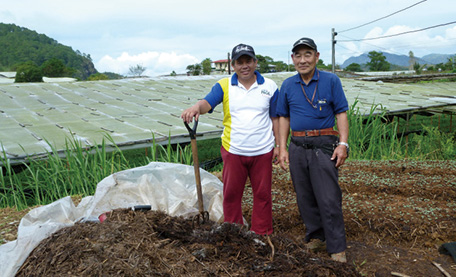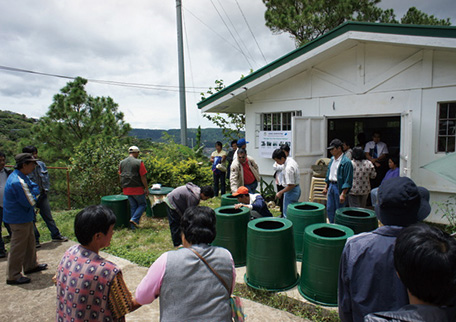Japan's Official Development Assistance White Paper 2012
Stories from the field 6
Charcoal, Vinegar and Compost Heal Philippine Farmlands!
– Growing Safe Vegetables While Caring For the Soil –

Mr. Yokomori giving practical instruction to farmers on creating compost (Photo: JAEC)
A plateau stretches across Benguet Province in the northwest part of the island of Luzon in the Philippines. Farmers take advantage of the area's cool climate to produce an abundance of vegetables. However, they also exhaust the soil of their farmlands by using pesticides and chemical fertilizers and practicing continuous cropping without fallow periods or enriching the soil. As a result, productivity is suffering and there are issues with residual pesticides. The Japan Agricultural Exchange Council (JAEC) stood up to improve such circumstances and enhance the livelihoods of farmers. JAEC aims to advance the level of agriculture in both Japan and in developing countries through practical training projects for people involved in agriculture. Under the cooperation by JICA, the support for agricultural industries in Benguet started in 2007, and the project continues with the launch of Safe Vegetable Production & Marketing Project with Soil / Resource Conservation in 2012.
JAEC Senior Technical Advisor Masaki Yokomori has worked in agriculture in Nagano Prefecture over the past 30 years and is a man of conviction. "Many people have helped me along my career in agriculture," he said. "I can't repay them directly, so I pay it forward by supporting the Philippines. I want to develop young farmers who will produce the food supply in the future."
The project has familiarized beneficiaries with farming skills, which could minimize the use of pesticides and chemical fertilizers as much as possible, and proposed to establish a marketing and distribution system of these vegetables cultivated with reduced chemicals. Instead of pesticides, Mr. Yokomori uses charcoal and wood vinegar. These substances effectively improve soil by encouraging activity in microbes and protect against diseases and pests.

Compost containers made by removing the bottoms of large plastic buckets (Photo: JAEC)
Mr. Yokomori held a class for local farmers as his technical advisory in Benguet, but he faced a major obstacle: "I didn't know anything about the climate or soil conditions in Benguet, or about the way the farmers thought. So, no matter how I tried to explain things to them with words, the message was not getting through."
Mr. Yokomori decided to go practical. He made a pilot farm on his own and worked with local farmers to grow produce. Though it was his first piece of land in that area, and though drought, typhoons and other unexpected phenomena visited the pilot farm, they were somehow able to produce vegetables as he had imagined. Mr. Yokomori taught by doing rather than talking, and the local farmers took to his lessons. Even so, he felt that there were limits to how much he could familiarize local farmers with his skills. He had invited proactive farmers to Japan for training, but some of them gave up on farming with reduced chemicals after returning to the Philippines. The project team appealed to mayors, the regional executive director of the Philippine Department of Agriculture and other leaders of government agencies to begin training local leaders as part of the project. The team did that because the government leaders were worried that Philippine agriculture was producing vegetables tainted with pesticide residue.
The training immediately produced results. Spurred by the mayor of La Trinidad, one of the target areas for the training, farmers who participated in the project formed a union and became more active. To enrich the soil, they adopted Japanese composting to make use of garbage from residential kitchens and distributed a set of 500 compost containers throughout the town. They built a small-scale model plant to produce the compost under the project, and the town came in and built a large plant based on the model plant. Now, half of the 30-plus tons of food waste generated in La Trinidad each day becomes compost and is used in farmers’ fields. When farmers started using charcoal and wood vinegar in addition to the compost, they cut production costs significantly by spending less money on pesticides and chemical fertilizers.
The neighboring town of Tublay learned of these efforts and their results, and soon all towns in Benguet Province requested technical aid. In response to the desire for aid, the project has been extended twice, from 2010 to 2012 and then from 2012 to 2015. "I want to continue to offer advice on all aspects, from production to sales, in order to eliminate useless processes and operations and increase farmers' incomes," Mr. Yokomori said. "I want farmers in the Philippines to be capable of managing all aspects from production to sales of their businesses. The Philippine economy is entering a phase of rapid growth. Things will become more difficult for small farms. Farmers need to have a vision of the future and think about how they will respond amidst changing conditions."
